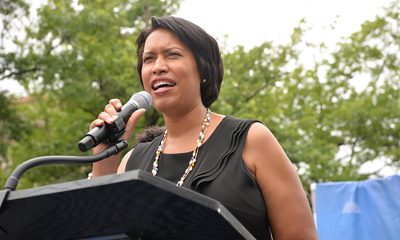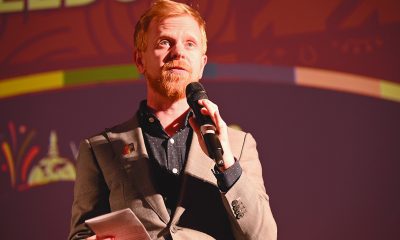District of Columbia
Casa Ruby receiver files complaint against Ruby Corado, former board members
Wanda Alston Foundation seeks restitution, ‘punitive damages’
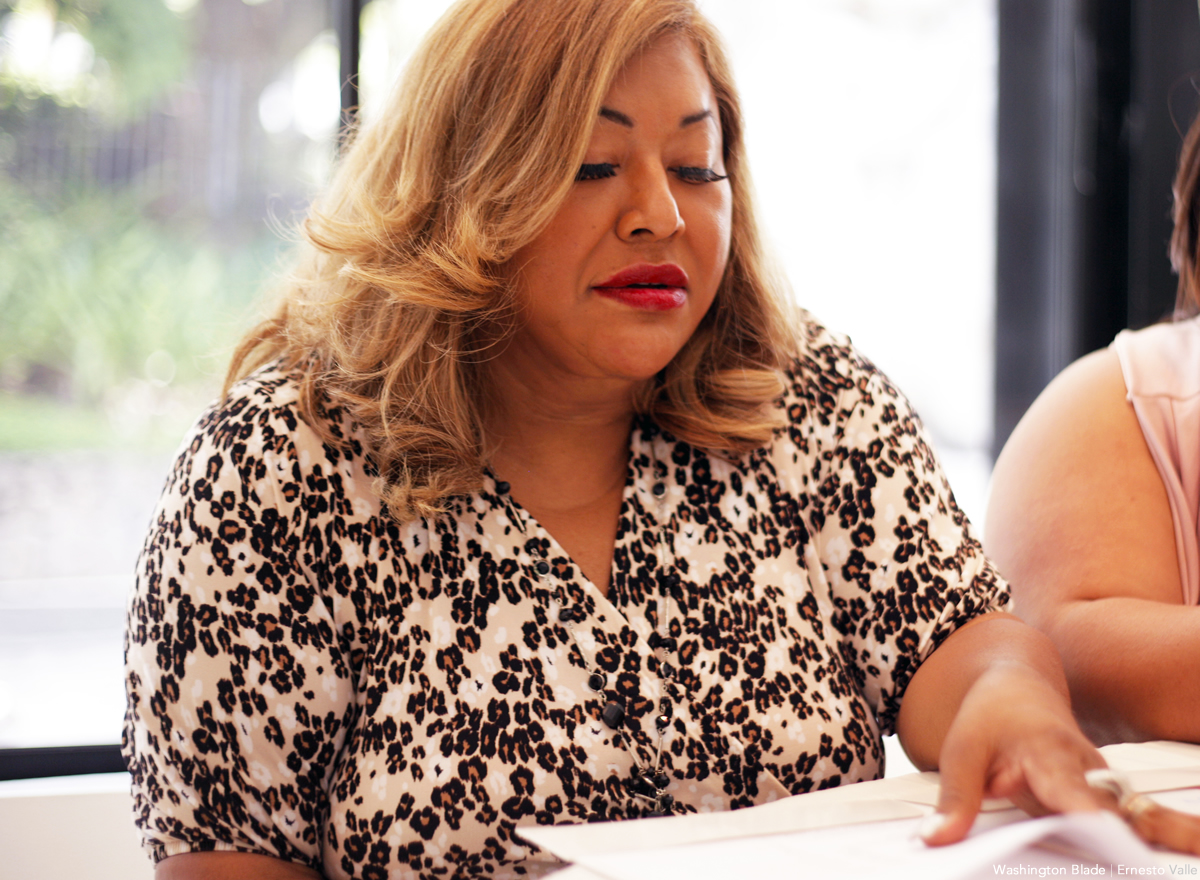
The Wanda Alston Foundation, which assumed control over the operations of the LGBTQ community services group Casa Ruby in August under a court appointed receivership role, filed its own civil complaint on Dec. 23 in D.C. Superior Court against former Casa Ruby Executive Director Ruby Corado and eight former members of the Casa Ruby board of directors.
News of the Wanda Alston Foundation complaint surfaced at a Jan. 6 D.C. Superior Court status hearing for the pending civil complaint against Casa Ruby and Corado filed by the Office of the D.C. Attorney General this past July and as amended by the office with additional allegations in November.
The attorney general’s complaint, among other things, alleges that Casa Ruby, under Corado’s leadership, violated the city’s Nonprofit Corporations Act in connection with its financial dealings. The amended complaint charges that Corado withdrew more than $400,000 of Casa Ruby funds for unauthorized use in El Salvador.
For unexplained reasons, the Superior Court’s online court records, including the court docket, did not show that the Wanda Alston Foundation had filed its separate complaint against Corado and the board members as of Friday, the day of the court status hearing.
The court docket as of Jan. 6 also did not show that the Wanda Alston Foundation on Dec. 16 filed its Receiver’s Third Interim Report, which is highly critical of Corado and the Casa Ruby board. The Washington Blade obtained copies of the interim report and the Wanda Alston Foundation complaint from the court’s media and public affairs director.
The Wanda Alston Foundation complaint identifies each of the eight former board members as defendants and “respectfully request[s] restitution, compensatory damages, punitive damages, receivership fees and expenses, court costs, attorneys’ fees and expenses, and any other relief the court deems necessary and proper.”
The board of directors “failed to hold regular meetings and/or maintain official records — thereby exercising no oversight or governance over the organization,” the complaint states.
“Ever Alfaro, Carlos Gonzales, Consuella Lopez, Jackie Martinez, Hassan Naveed, Jack Quintana-Harrison (sic), Miguel Rivera and Meredith Zotlick were directors of Casa Ruby, Inc.,” the complaint says. “By neglecting their duty to provide any oversight and governance, they engaged in a persistent course of conduct that caused tortious injury to the organization,” the complaint states.
Harrison-Quintana on Saturday declined to comment to the Blade. Lopez and Naveed did not return requests for comment.
In its allegations against Corado, which it says are based on its own investigation since assuming the role as Casa Ruby receiver, the Wanda Alston Foundation complaint uses stronger language than that used in the D.C. attorney general’s complaint.
“Ms. Corado drained the organization’s accounts and unjustly enriched herself through multiple cash withdrawals, checks and money orders, wire transactions, online payment services and electronic funds transfers to herself and to other companies that she set up — embezzling over $800,000 from the organization,” the complaint states.
Superior Court Judge Danya A. Dayson, who is presiding over the Casa Ruby case, pointed out at the Jan. 6 court hearing that the Wanda Alston Foundation submitted a required court filing called a Motion for Leave asking for permission to file its own complaint against Corado, the Casa Ruby board members and the three individual companies that Corado created that are defendants in the attorney general’s complaint.
Dayson said the parties named in the Wanda Alston Foundation complaints have a right to file an objection to the Motion for Leave, and she set a deadline of Friday, Jan. 13, for filing such an objection. The judge then said if she approves the Motion for Leave by the Wanda Alston Foundation, the deadline for the parties, including Corado and the board members, to file a response to the Wanda Alston Foundation’s complaint against them will be March 6.
Dayson said the parties named in the attorney general’s complaint, which include Corado and companies she created, must also file their response to that complaint by March 6.
Corado has denied engaging in any improper financial actions and has insisted the Casa Ruby board approved her actions, including her decision to open a Casa Ruby operation in El Salvador.
In an interview last month in El Salvador, where she now lives, Corado told the Blade the allegations that D.C. officials have made against her amount to “persecution.”
At the Jan. 6 status hearing, which was held virtually through the court’s online Webex system, Corado reiterated what she has said in previous court hearings — that the D.C. government was responsible for Casa Ruby’s closing in July 2022 by withholding hundreds of thousands of dollars that Corado says the city owes Casa Ruby for services it provided under city grants.
City officials have disputed those claims, saying the funds were withheld or discontinued because Casa Ruby did not provide the required documentation or reports showing that it performed the work associated with city grants.
Similar to an earlier court hearing in September, Corado at the Jan. 6 hearing told Dayson that she had yet to retain an attorney to represent her. Dayson told Corado that because she is named as a defendant in the attorney general’s complaint and in the complaint filed by the Wanda Alston Foundation, which is listed as a “cross complaint,” Corado or an attorney representing her must file a response to the complaints.
The judge also pointed out that Corado is listed as the registered agent for three limited liability companies that Corado created to reportedly help Casa Ruby provide services to its clients, including a Casa Ruby pharmacy. Both the attorney general’s complaint and the Wanda Alston Foundation compliant name the three LLC companies as defendants. The judge said Corado would be responsible for arranging for the three LLCs to file a response to the two complaints against them.
In its 12-page Receiver’s Third Interim Report filed in court on Dec. 16, the Wanda Alston Foundation said it conducted its own investigation into Casa Ruby’s operations using, among other things, detailed financial records it obtained from Ayala, Vado and Associates, an accounting firm that provided accounting services for Casa Ruby for over five years from at least 2016 to 2020. The documents it obtained, the report says, include multiple Casa Ruby bank records and records of cash withdrawals by Corado.
“Based on our review of the accounting firm’s records, Casa Ruby, Inc. did not collapse due to the loss of an $800,000 grant from the District of Columbia,” the report says. “In 2021, financial records show deposits from multiple revenue streams totaling $5,169,098 to M&T Tailored Business Checking Account,” the Wanda Alston Foundation report says, noting that a significant stream of income came from private donors.
“The organization failed because of multiple cash withdrawals and overseas transfers that Ms. Corado made to set herself up for a lavash retirement in El Salvador,” the report states. “She made no secret of her intentions — openly broadcasting them on social media,” it says. “When it was evident that there was no meaningful oversight by the board of directors, she finally dropped all pretenses and started openly looting the organization.”
Nick Harrison, an attorney representing the Wanda Alston Foundation in its role as the Casa Ruby receiver, told the Blade the Wanda Alston Foundation decided to file its own complaint as an extension of its mission of serving the needs of the LGBTQ community.
“In our capacity as receiver, the Wanda Alston Foundation has taken legal action in the form of a cross-party complaint and a third-party complaint to attempt to recover some of the financial losses of Casa Ruby,” Harrison said. He said the Wanda Alston Foundation complaint names Casa Ruby board members as defendants because the board “had a legal and ethical responsibility to protect the organization’s finances, the vulnerable clients they served, and the community members they employed.”
In her interview with the Blade from El Salvador in December, Corado said she believes she is being targeted because she always tells the truth and people are being distracted from the truth because of a system that benefits from “lies and defamation.”
During the Jan. 6 court hearing, Corado said she has received threats against her life since the D.C. attorney general first filed its complaint against her and the Wanda Alston Foundation released derogatory statements against her in the receiver’s reports.
“It really puts my life in danger,” she said.
Dayson scheduled the next court hearing for the Casa Ruby case on March 17.
District of Columbia
Kennedy Center renaming triggers backlash
Artists who cancel shows threatened; calls for funding boycott grow

Efforts to rename the Kennedy Center to add President Trump’s name to the D.C. arts institution continue to spark backlash.
A new petition from Qommittee , a national network of drag artists and allies led by survivors of hate crimes, calls on Kennedy Center donors to suspend funding to the center until “artistic independence is restored, and to redirect support to banned or censored artists.”
“While Trump won’t back down, the donors who contribute nearly $100 million annually to the Kennedy Center can afford to take a stand,” the petition reads. “Money talks. When donors fund censorship, they don’t just harm one institution – they tell marginalized communities their stories don’t deserve to be told.”
The petition can be found here.
Meanwhile, a decision by several prominent musicians and jazz performers to cancel their shows at the recently renamed Trump-Kennedy Center in D.C. planned for Christmas Eve and New Year’s Eve has drawn the ire of the Center’s president, Richard Grenell.
Grenell, a gay supporter of President Donald Trump who served as U.S. ambassador to Germany during Trump’s first term as president, was named Kennedy Center president last year by its board of directors that had been appointed by Trump.
Last month the board voted to change the official name of the center from the John F. Kennedy Memorial Center For The Performing Arts to the Donald J. Trump And The John F. Kennedy Memorial Center For The Performing Arts. The revised name has been installed on the outside wall of the center’s building but is not official because any name change would require congressional action.
According to a report by the New York Times, Grenell informed jazz musician Chuck Redd, who cancelled a 2025 Christmas Eve concert that he has hosted at the Kennedy Center for nearly 20 years in response to the name change, that Grenell planned to arrange for the center to file a lawsuit against him for the cancellation.
“Your decision to withdraw at the last moment — explicitly in response to the Center’s recent renaming, which honors President Trump’s extraordinary efforts to save this national treasure — is classic intolerance and very costly to a non-profit arts institution,” the Times quoted Grenell as saying in a letter to Redd.
“This is your official notice that we will seek $1 million in damages from you for this political stunt,” the Times quoted Grenell’s letter as saying.
A spokesperson for the Trump-Kennedy Center did not immediately respond to an inquiry from the Washington Blade asking if the center still planned to file that lawsuit and whether it planned to file suits against some of the other musicians who recently cancelled their performances following the name change.
In a follow-up story published on Dec. 29, the New York Times reported that a prominent jazz ensemble and a New York dance company had canceled performances scheduled to take place on New Year’s Eve at the Kennedy Center.
The Times reported the jazz ensemble called The Cookers did not give a reason for the cancellation in a statement it released, but its drummer, Billy Hart, told the Times the center’s name change “evidently” played a role in the decision to cancel the performance.
Grenell released a statement on Dec. 29 calling these and other performers who cancelled their shows “far left political activists” who he said had been booked by the Kennedy Center’s previous leadership.
“Boycotting the arts to show you support the arts is a form of derangement syndrome,” the Times quoted him as saying in his statement.
District of Columbia
New interim D.C. police chief played lead role in security for WorldPride
Capital Pride says Jeffery Carroll had ‘good working relationship’ with organizers
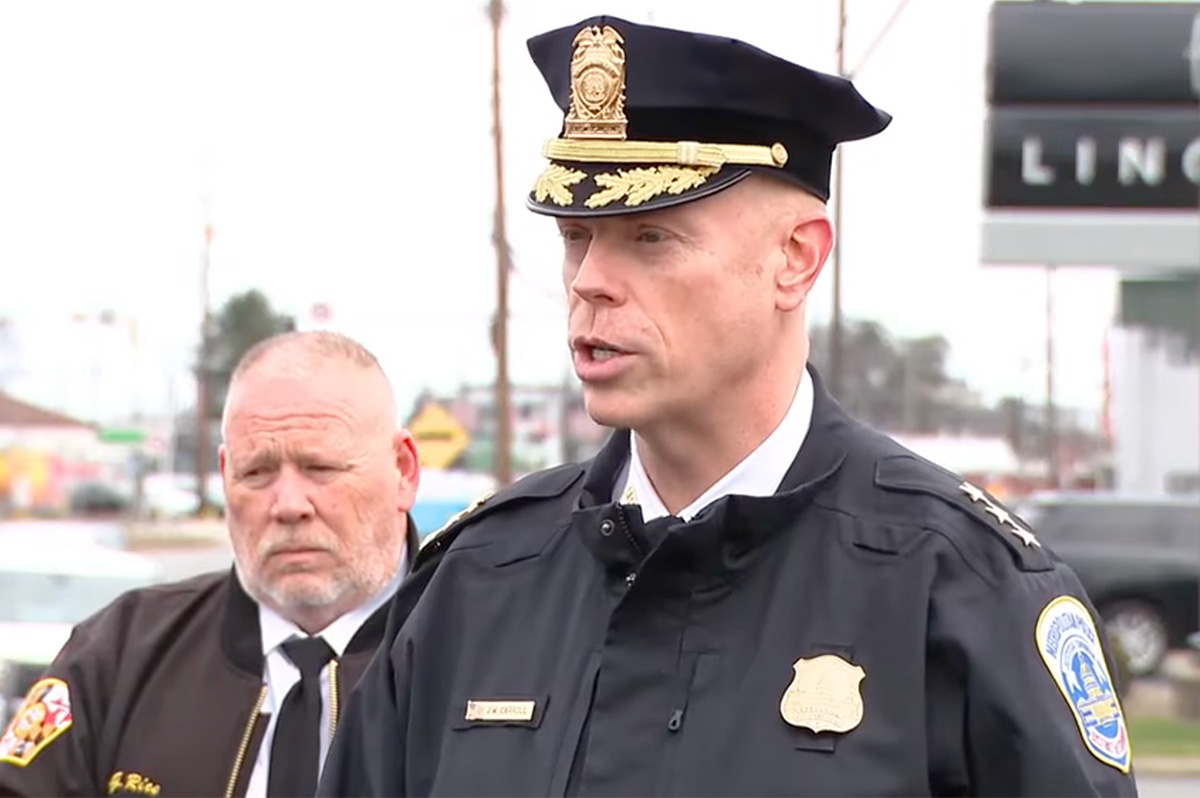
Jeffery Carroll, who was named by D.C. Mayor Muriel Bowser on Dec. 17 as the city’s Interim Chief of Police, played a lead role in working with local LGBTQ community leaders in addressing public safety issues related to WorldPride 2025, which took place in D.C. last May and June
“We had a good working relationship with him, and he did his job in relation to how best the events would go around safety and security,” said Ryan Bos, executive director of Capital Pride Alliance.
Bos said Carroll has met with Capital Pride officials in past years to address security issues related to the city’s annual Capital Pride parade and festival and has been supportive of those events.
At the time Bowser named him Interim Chief, Carroll had been serving since 2023 as Executive Assistant Chief of Specialized Operations, overseeing the day-to-day operation of four of the department’s bureaus. He first joined the D.C. Metropolitan Police Department in 2002 and advanced to multiple leadership positions across various divisions and bureaus, according to a statement released by the mayor’s office.
“I know Chief Carroll is the right person to build on the momentum of the past two years so that we can continue driving down crime across the city,” Bowser said in a statement released on the day she announced his appointment as Interim Chief.
“He has led through some of our city’s most significant public safety challenges of the past decade, he is familiar with D.C. residents and well respected and trusted by members of the Metropolitan Police Department as well as our federal and regional public safety partners,” Bowser said.
“We have the best police department in the nation, and I am confident that Chief Carroll will meet this moment for the department and the city,” Bowser added.
But Bowser has so far declined to say if she plans to nominate Carroll to become the permanent police chief, which requires the approval of the D.C. City Council. Bowser, who announced she is not running for re-election, will remain in office as mayor until January 2027.
Carroll is replacing outgoing Chief Pamela Smith, who announced she was resigning after two years of service as chief to spend more time with her family. She has been credited with overseeing the department at a time when violent crime and homicides declined to an eight-year low.
She has also expressed support for the LGBTQ community and joined LGBTQ officers in marching in the WorldPride parade last year.
But Smith has also come under criticism by members of Congress, who have accused the department of manipulating crime data allegedly showing lower reported crime numbers than actually occurred. The allegations came from the Republican-controlled U.S. House Oversight Committee and the U.S. Justice Department
Bowser has questioned the accuracy of the allegations and said she has asked the city’s Inspector General to look into the allegations.
Meanwhile, a spokesperson for the D.C. police Office of Public Affairs did not immediately respond to a question from the Washington Blade about the status of the department’s LGBT Liaison Unit. Sources familiar with the department have said a decline in the number of officers currently working at the department, said to be at a 50-year low, has resulted in a decline in the number of officers assigned to all of the liaison units, including the LGBT unit.
Among other things, the LGBT Liaison Unit has played a role in helping to investigate hate crimes targeting the LGBTQ community. As of early Wednesday an MPD spokesperson did not respond to a question by the Blade asking how many officers are currently assigned to the LGBT Liaison Unit.
District of Columbia
Imperial Court of Washington drag group has ‘dissolved’
Board president cites declining support since pandemic
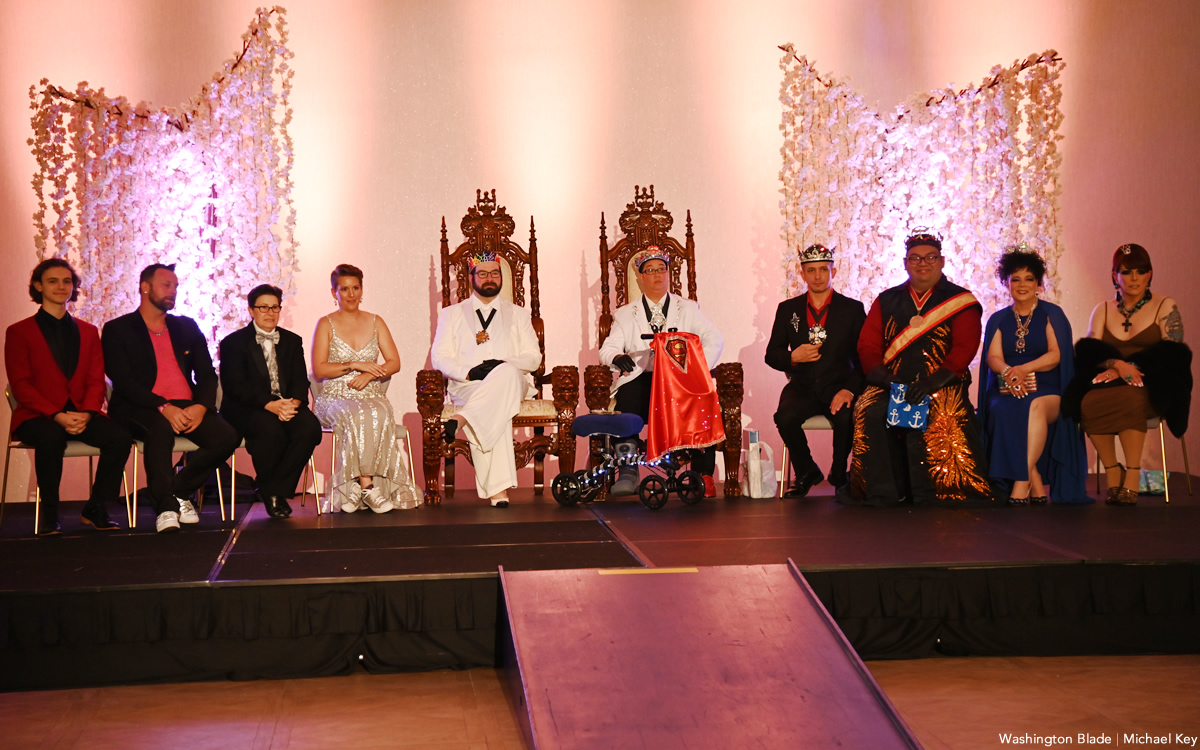
The Imperial Court of Washington, a D.C.-based organization of drag performers that has raised at least $250,000 or more for local LGBTQ and non-LGBTQ charitable groups since its founding in 2010, announced on Jan. 5 that it has ended its operations by dissolving its corporate status.
In a Jan. 5 statement posted on Facebook, Robert Amos, president of the group’s board of directors, said the board voted that day to formally dissolve the organization in accordance with its bylaws.
“This decision was made after careful consideration and was based on several factors, including ongoing challenges in adhering to the bylaws, maintaining compliance with 501(c)(3) requirements, continued lack of member interest and attendance, and a lack of community involvement and support as well,” Amos said in his statement.
He told the Washington Blade in a Jan. 6 telephone interview that the group was no longer in compliance with its bylaws, which require at least six board members, when the number of board members declined to just four. He noted that the lack of compliance with its bylaws also violated the requirements of its IRS status as a nonprofit, tax-exempt 501(c) (3) organization.
According to Amos, the inability to recruit additional board members came at a time when the organization was continuing to encounter a sharp drop in support from the community since the start of the COVID pandemic around 2020 and 2021.
Amos and longtime Imperial Court of Washington member and organizer Richard Legg, who uses the drag name Destiny B. Childs, said in the years since its founding, the group’s drag show fundraising events have often been attended by 150 or more people. They said the events have been held in LGBTQ bars, including Freddie’s Beach Bar in Arlington, as well as in other venues such as theaters and ballrooms.
Among the organizations receiving financial support from Imperial Court of Washington have been SMYAL, PFLAG, Whitman-Walker Health’s Walk to End HIV, Capital Pride Alliance, the DC LGBT Community Center, and the LGBTQ Fallen Heroes Fund. Other groups receiving support included Pets with Disabilities, the Epilepsy Foundation of Washington, and Grandma’s House.
The Imperial Court of Washington’s website, which was still online as of Jan. 6, says the D.C. group has been a proud member of the International Court System, which was founded in San Francisco in 1965 as a drag performance organization that evolved into a charitable fundraising operation with dozens of affiliated “Imperial Court” groups like the one in D.C.
Amos, who uses the drag name Veronica Blake, said he has heard that Imperial Court groups in other cities including Richmond and New York City, have experienced similar drops in support and attendance in the past year or two. He said the D.C. group’s events in the latter part of 2025 attracted 12 or fewer people, a development that has prevented it from sustaining its operations financially.
He said the membership, which helped support it financially through membership dues, has declined in recent years from close to 100 to its current membership of 21.
“There’s a lot of good we have done for the groups we supported, for the charities, and the gay community here,” Amos said. “It is just sad that we’ve had to do this, mainly because of the lack of interest and everything going on in the world and the national scene.”
-

 District of Columbia5 days ago
District of Columbia5 days agoImperial Court of Washington drag group has ‘dissolved’
-

 Colombia4 days ago
Colombia4 days agoGay Venezuelan man who fled to Colombia uncertain about homeland’s future
-

 District of Columbia4 days ago
District of Columbia4 days agoKennedy Center renaming triggers backlash
-

 Arts & Entertainment4 days ago
Arts & Entertainment4 days ago2026 Most Eligible LGBTQ Singles nominations

